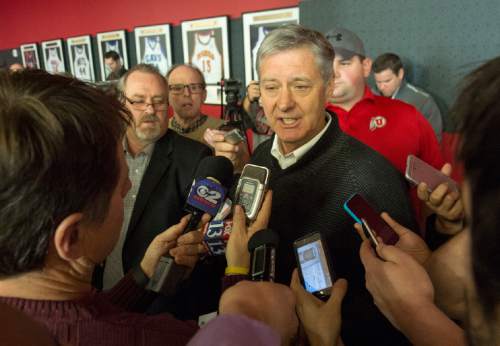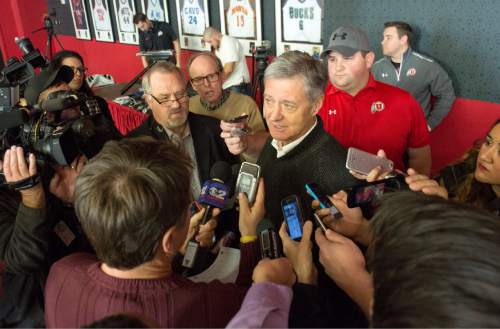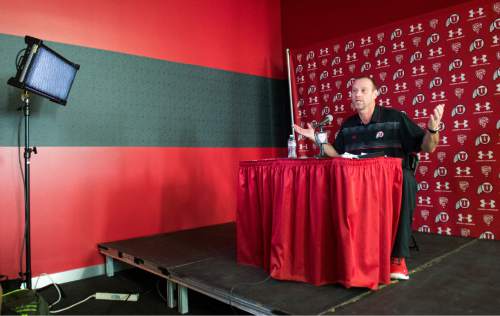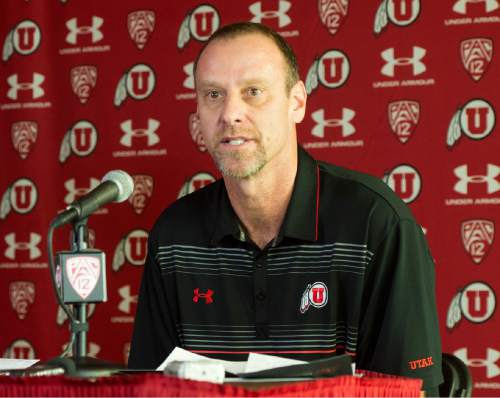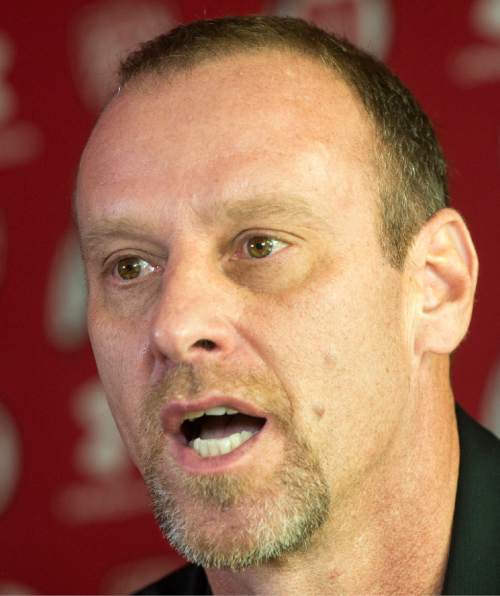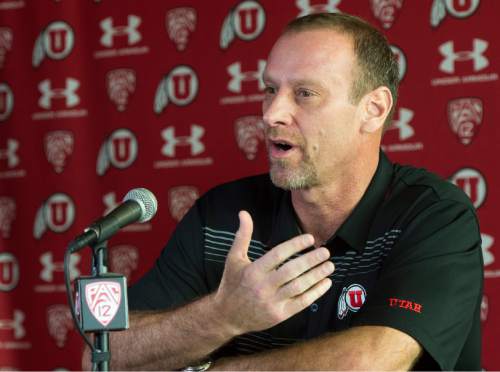This is an archived article that was published on sltrib.com in 2016, and information in the article may be outdated. It is provided only for personal research purposes and may not be reprinted.
Five days after the cancellation of the next Utah-BYU basketball game became public, Utes coach Larry Krystkowiak defended his decision, citing a "highly venomous and toxic environment" in the rivalry that he feels has put his players at risk.
Krystkowiak said he saw an "escalating pattern of behavior" with rough-and-tumble incidents in Utah's most recent three games with BYU, all of which Utah won. The Cougars have been cited for two flagrant fouls against the Utes in the past three years, and Krystkowiak said another incident in the 2014 game in Provo (which was not called) set him on a course to cancel the series for the 2016 matchup — a decision supported by Utah athletic director Chris Hill and school president David Pershing.
While he acknowledged he's taken a lot of flak and for making the call to cancel, he cited his responsibility as a coach to protect his players' well-being — a belief he holds so strongly, he's paying out of pocket to buy out of the game, which would've been played in December.
"I've always been a big fan of rivalries, that's been one of my favorite parts about college sports," he said. "I also believe I would not be doing my job, in the description that it's given to me for the well-being of our players and our program, if I didn't have reason to pause and concern about the nature of some of the recent games."
Krystkowiak and Hill said they discussed other options, but Krystkowiak said he didn't really strongly consider them. He said he thought a tete-a-tete with BYU coach Dave Rose wasn't a "realistic" solution to his reservations — which he claimed was compounded by "what I consider a lack of remorse after the behavior." He took it to mean that nothing would change.
He said that while Rose apologized immediately after the most recent game on Dec. 2 when BYU guard Nick Emery struck Utah guard Brandon Taylor and — Krystkowiak alleged — told him to stay down, the program hadn't received any other personal follow-up or apology from the Cougars, apart from Rose's apology in a handshake with Krystkowiak immediately after the buzzer.
BYU did release a statement in which Emery apologized after the incident.
Last week, ESPN reported that Utah's buyout in the contract was $80,000. Hill said Krystkowiak "was involved in making a commitment personally on that" in his discussions with Hill and Pershing over the weekend. The school later confirmed Krystkowiak was paying the buyout on the contract and paid the first installment on Monday.
Hill said he knew the decision would draw a lot of criticism from the outside, and also within the Utah base, at least some of which wouldn't appreciate the series' second hiatus since it began in 1909. But he, too, said he felt the rivalry has been "more toxic" in the past three to four years — which also saw a hiatus in Utah's football series with BYU — and he fully supports Krystkowiak's decision.
"I think the most important thing is, you're a team: Larry and I are a team," he said. "If we're not a team, we're in trouble. I want to support my coach when I think it's appropriate."
Adding to Rose's comments last week expressing disappointment, BYU president Kevin Worthen and athletic director Tom Holmoe released statements of their desire for the rivalry to resume.
"As a former player, coach and now administrator, I believe BYU-Utah is one of the great college rivalries in the country," Holmoe said. "It is bigger than any of the individual participants and should be played every year."
The series is Utah's most-played rivalry, and is almost a dead heat: BYU has 129 wins, and Utah has 128. In recent history, Rose has a 12-6 overall record against the Utes, but Krystkowiak has won the past three meetings. The series has been played uninterrupted since 1944, and survived — until now — the 2011 change in conferences for both schools.
The cancellation conjured up discussion among fans and pundits of whether Utah, now in the Pac-12, is making a power play against its West Coast Conference neighbor to increase leverage in future negotiations or show dominance in the relationship. BYU fans have also decried Krystkowiak for bowing out of the contract's final game in Provo, historically a tough place to play for the Utes.
While Krystkowiak said it was his intent to protect his players when making the decision, he added that he thought the difference in the two schools' leagues may be a factor that is amping up tension in the rivalry.
"When you say, 'We're not in their league anymore,' it takes on a different definition," he said. "And so perhaps, that creates a little bit more fuel that wasn't there when you were in the same league."
Krystkowiak said reviewing film of the last few years helped push him to cancel the game.
Though he didn't cite other specific incidents, it is assumed he was referencing a flagrant foul BYU center Eric Mika committed against Utah center Dallin Bachynski in 2013, and another hard hit on one of his players (understood to be against Utah center Jakob Poeltl) in 2014 that wasn't called for a foul .
While Krystkowiak acknowledged he carried a tough-guy reputation in his NBA career — he called himself a "hockey thug" as a pro — he said he also made the decision to help keep his own conduct in line, acknowledging his own emotions are flared up by the rivalry. He added, "I almost got carried away this year," referencing his outburst after Emery struck Taylor.
"I think if you know me, I'm not interested in backing down. That's one of my shortfalls, kind of the eye-for-the-eye mentality," he said. "Do you see my dilemma as a basketball coach? There's part of this that I'm protecting myself from myself."
A statement from Pershing said the school will form a group of faculty, staff, students and fans to help identify "changes that can be made to ensure future athletic contests are exciting and respectful for all." Worthen said in his own statement that BYU will continue working on the same issues.
Hill said the Utes had not yet determined a nonconference opponent to play in BYU's place.
Both Hill and Krystkowiak said the Utes will aim to play least two in-state games every year in the future. Utah played BYU and Southern Utah this year. The Utes haven't played Utah State since 2010 and haven't played Weber State since 2011.
Hill said he's "warming up" to the idea that in-state schools could play a regular-season tournament at Vivint Smart Home Arena. But at the very least, Utah wants to make sure it continues in-state series, including ones that have been dormant.
"We want to make sure we have some on the schedule," Hill said. "Me and the president mentioned [to Krystkowiak] we want to play some of these games every year."
Just not BYU — not in 2016.
Twitter: @kylegoon —
Oregon at Utah
P Thursday, 8 p.m.
TV • Pac-12 Network


